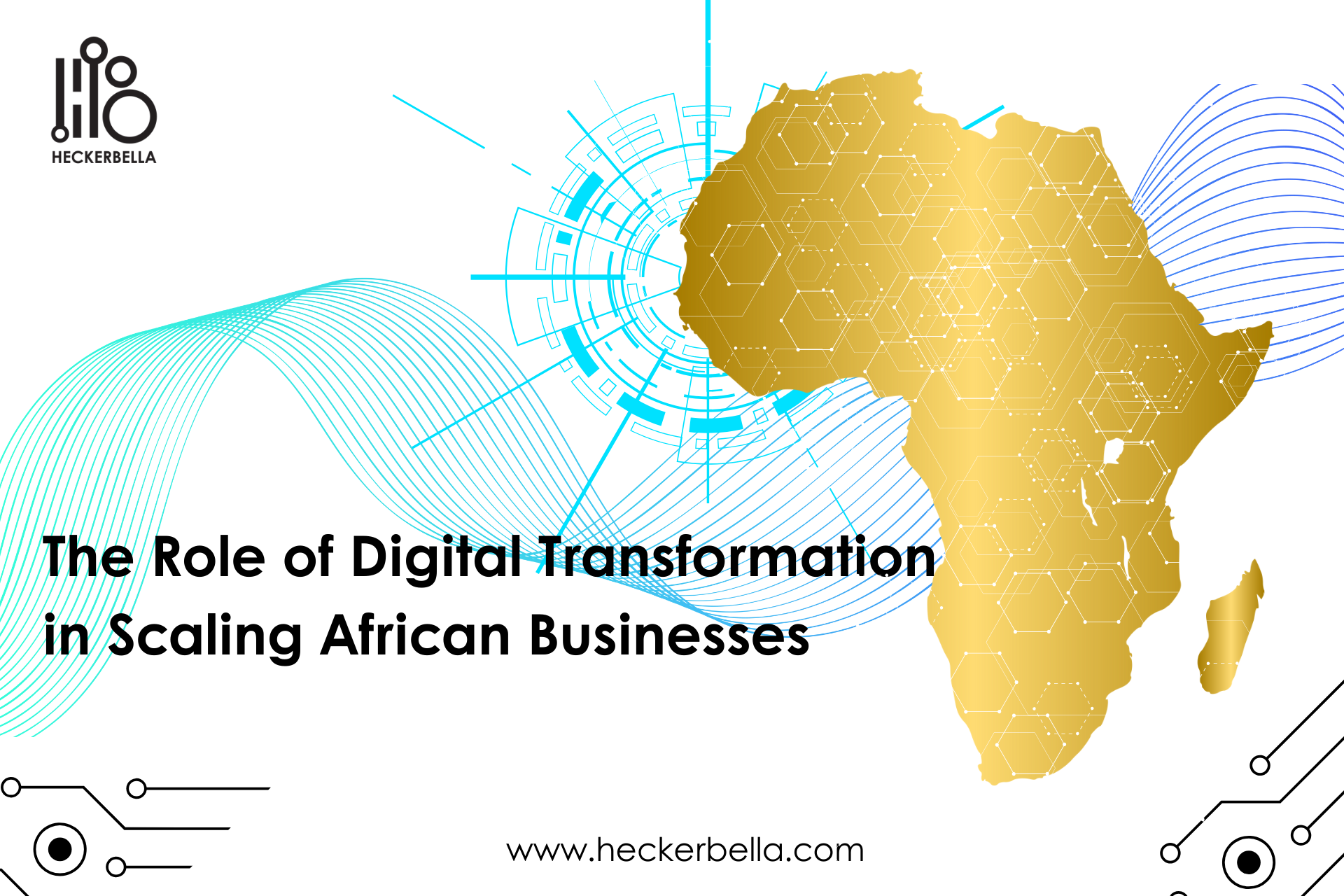The Role of Digital Transformation in Scaling African Businesses

At Heckerbella, we believe that digital transformation is the catalyst for Africa’s economic growth, enabling businesses to scale efficiently, enhance customer experiences, and drive innovation. As mobile connectivity, fintech solutions, and e-commerce continue to expand, technology is no longer an option, it is a necessity.
In a continent where traditional business models often face infrastructure challenges, digital technologies provide a bridge to new opportunities. From automating operations to expanding market reach, African businesses that embrace digital transformation are poised to thrive in an increasingly competitive global economy. This article explores the key areas where technology is making the most impact and how businesses can leverage digital transformation to scale sustainably.
The Digital Shift
For decades, many African businesses have relied on traditional, often manual processes for operations, customer engagement, and financial transactions. However, with the rapid penetration of internet services, mobile technology, and cloud computing, a new wave of efficiency and scalability is emerging.
According to recent data by Statista https://www.statista.com/topics/9813/internet-usage-in-africa/ over 570 million people in Africa now use mobile internet, enabling businesses to reach customers beyond their immediate locations. Digital transformation allows businesses to:
- Expand into new markets without requiring a physical presence.
- Automate operations, reducing costs and increasing productivity.
- Enhance customer engagement through data-driven insights and digital platforms.
Key Areas Where Digital Transformation is Driving Growth
1. Fintech and Digital Payments
Financial inclusion remains a significant challenge for many African businesses, particularly small and medium-sized enterprises (SMEs). However, digital payment solutions like M-Pesa, Flutterwave, and Paystack have revolutionized financial transactions, enabling businesses to operate seamlessly without traditional banking infrastructure.
With mobile money platforms and digital wallets, businesses can:
- Accept payments securely across different regions.
- Reduce reliance on cash transactions, improving financial transparency.
- Scale faster by integrating with global payment systems.
2. E-commerce and Online Marketplaces
E-commerce is redefining retail in Africa, providing businesses access to millions of consumers who prefer digital shopping experiences. Platforms like Jumia, Konga, and Takealot have created thriving digital marketplaces, while social media commerce on Instagram, Facebook Marketplace, and WhatsApp Business empowers smaller businesses to reach customers directly.
Adopting an e-commerce strategy enables businesses to:
- Expand customer reach beyond geographical limitations.
- Reduce operational costs compared to traditional retail.
- Leverage data analytics to personalize marketing and improve sales.
3. Cloud Computing and Remote Work Solutions
The shift to cloud-based solutions has allowed African businesses to scale operations without heavy infrastructure investments. Tools like Microsoft Teams, Google Workspace, and Zoom facilitate remote collaboration, making businesses more agile and accessible to global talent.
Benefits of cloud computing include:
- Enhanced data security and backup systems.
- Cost savings by reducing reliance on physical servers.
- Seamless remote work solutions, increasing workforce flexibility.
4. Digital Marketing and Social Media Growth
With over 250 million active social media users in Africa, digital marketing has become a critical growth tool for businesses. Platforms like Facebook, Instagram, LinkedIn, and Twitter provide direct access to customers, while strategies such as SEO, pay-per-click advertising (PPC), and influencer marketing drive brand visibility and engagement.
Key advantages include:
- Cost-effective brand promotion compared to traditional advertising.
- Targeted customer engagement through data-driven insights.
- Real-time customer feedback for continuous improvement.
5. Artificial Intelligence (AI) and Automation
AI-driven innovations are transforming various industries in Africa, from healthtech and agritech to logistics and finance. Businesses are leveraging AI-powered chatbots for customer service, predictive analytics for sales forecasting, and automation tools to optimize processes.
Notable AI applications include:
- Agri-Tech: Precision farming using AI to optimize crop yields.
- Health-Tech: AI-assisted diagnostics and telemedicine solutions.
- Logistics: Smart routing and delivery tracking powered by AI.
Challenges of Digital Transformation in Africa
While digital transformation presents immense opportunities, businesses must overcome key challenges, including:
- Limited Internet Access – Rural areas still struggle with reliable connectivity.
- High Cost of Technology – Advanced digital tools can be expensive for SMEs.
- Cybersecurity Risks – Increased digital adoption comes with higher cyber threats.
- Skill Gaps – A shortage of digital talent slows down technology adoption.
How Businesses Can Successfully Adopt Digital Transformation
To navigate these challenges, businesses should consider the following strategies:
- Invest in Digital Skills Development – Provide in-house training or partner with digital education platforms.
- Leverage Affordable Digital Solutions – Explore cloud services, open-source software, and local tech innovations.
- Strengthen Cybersecurity Measures – Implement encryption, firewalls, and multi-factor authentication (MFA).
- Adopt a Phased Approach – Start with customer engagement tools before scaling to cloud computing and automation.
- Collaborate with Tech Startups – Partner with fintech, agritech, and AI-driven companies for tailored digital solutions.
Looking Ahead: The Future of Digital Transformation in Africa
As Africa accelerates its adoption of 5G networks, blockchain technology, and AI-driven automation, digital transformation will continue to reshape industries. Governments and private sector leaders must collaborate to create enabling policies, build digital infrastructure, and promote digital literacy.
At Heckerbella, we are dedicated to driving Africa’s digital evolution by delivering custom-built, scalable, and innovative tech solutions. Businesses that embrace digital transformation today will be the industry leaders of tomorrow, driving economic progress and job creation across the continent.
Ready to scale your business with digital transformation?
Let’s build the future together.



